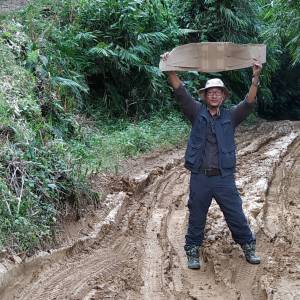Yai Thaba : Fishing Festival of Willong Khullen
Senapati 10 May. The traditional annual fishing festival popularly known as Yai Thaba of Willong Khullen, Senapati district concludes today with about 2000 people participating in the grand event at Barak River. This community fishing is one of the greatest festivals of the Maram people and is performed by beating a combination of Yai vines and a powder grounded from the bark of the tree called Ushoi. A stout stump made from tree trunks is used to beat the mixture laid upon big stones in the river water. The foam emanating from the beaten vines mixed with the river water and subsequently flow down along with the current. The effect of this solution makes the fish paralyzed and float near the surface, easy to be caught.
The festival starting from 9th May till 10th May has been hosted by Willong Khullen and has also been participated by people from neighbouring villages such as Sangkhumai, Willong Khunou, Pangmaram etc.
One day prior to the big day, able bodied men from the village gather Yai vines and barks from the tree named Ushoi from the forest. The Yai vines are bundled and left in strategic locations for pick up the next day on the way to the river. Womenfolk from the village wait in the outskirts of the village and received the men returning with Ushoi barks. The women in turn will carry the Ushoi barks. It is traditional for the men to present fish caught by them the next day to the women who helped them. The barks are then beaten to powder by the men and women, and stored in the village chief’s house, filled in gunny bags and ready for dispatch the next day to the riverside. The villagers then wait for the grand day readying their equipment.
Early next day, the villagers ate a hefty breakfast, packed their lunch and left for the riverside in vehicles like trucks, mini trucks, jeeps and cars, while some other took to hiking carrying knives, fishing contraptions like Long-up and nets. The people gather in the selected area of the river, the menfolk carrying the bundles of Yai vines. Some other people brought in the bags of Ushoi powder downloaded from trucks. The event is inaugurated by the chairman of the village authority R.Maling and two select able-bodied men, believed to be very simple and honest by the villagers, gave the first strike to the vines and the bark. This, they believe, will bring them a good catch since the fish will also follow their simple character and offer no resistance in their captivity whereas there may not be a good catch if smart and clever people make the first strike. A third man splashed water to the crushed vines to make the juice flow into the water. The first strike to the stunned fish should be made by the two select men with their knives.
Then, with customary cries of Uwee and Ayo, the rest of the men follow suit by pounding the vines and the bark while some other men with knives and the womenfolk with Long-up wait in the water for the catch. The men with knives are supposed to cut the stunned fish and offer it to the women, and the women will return the favour by returning the head of the fish along wine in a traditional Chumba jar and Morok ametpa when they reach home. Upto 3:00 in the afternoon, all the women are offered to take all the fish caught by themselves and the men.
The people gather fish going downstream with the current carrying the potent solution. They have covered a long distance of about 4 km from the starting point upto a steel bridge. The entire area affected by the Yai is to be kept in strict vigil by the participants by camping the night alongside the river banks. The catch continues till the next day when almost all the fish which can be detected are caught. Then, the participants return home with their catch, some raw and some smoked. It is traditional for the men to offer all the fish caught by them to the womenfolk and the elderly who could not take part in the event. Women who are recently married in and out of the village are also presented with the catch by their relatives. It is the customary belief of the Maram people that every possible care must be taken to make a good catch by avoiding beliefs such as accidental blood letting in the river by the participants which meant taboo and poor catch, since Maram people believed that a good catch will predict abundance of food for the year.
While the non-conventional practices of catching fish like medicating river water with bleaching powder, use of electric generator and explosives are banned in most of the hill areas by concerned authorities, the ill effects, if any, of this age-old practice have not been obvious. Yet, some of the villagers expressed that this traditional mixture may not be strong enough to stun the fish in near future due to various reasons. Still, it stands as one of the strongest bonding force for community participation.
- 6
- 2
- Nikon D800
- 1/250
- f/14.0
- 55mm
- 320

Comments
Sign in or get an account to comment.


